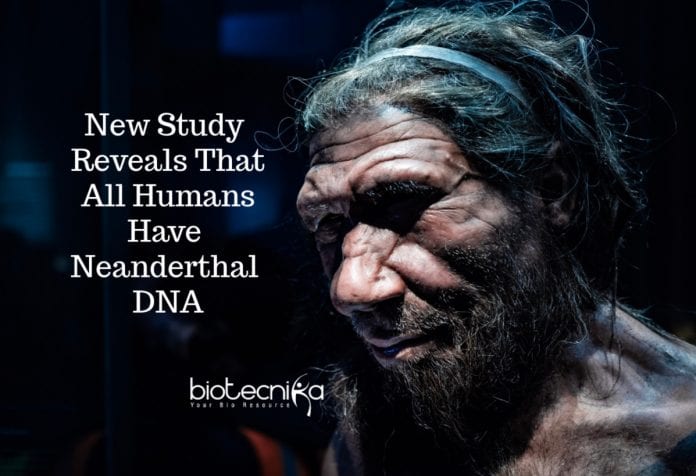A new study reveals that we humans, including Africans who had been thought to have no genetic link to our extinct human relative, are likely to have a bit of Neanderthal in our DNA. Neanderthals are an extinct species or subspecies of archaic humans who lived about until 40,000 years ago in Eurasia.
When the first genome extracted from the bones of the Stone Age hominins were sequenced in 2010, evidence that our early ancestors had babies with Neanderthals first emerged. Until around 40,000 years ago, these hominins populated Europe. It was found that modern Asians, Europeans, and Americans except for Africans, inherited about 2% of the genes from Neanderthals.
However, in this new study based on a new computational method, the researchers from Princeton University now believe that Africans do in fact have Neanderthal DNA.
At Princeton’s Lewis-Sigler Institute for Integrative Genomics (LSI), a postdoctoral research associate, Lu Chen said, ” The actual signal of Neanderthal ancestry in Africans has been detected for the first time now.”
The study’s lead, a professor at LSI, Joshua Akey suggested their findings cast doubt on the widely held “out of Africa” theory of human migration which said modern humans originated in Africa and in a single wave between 60,000 and 80,000 years ago, they made a single dispersal to the rest of the world. He said, “Our results show that there were many waves of dispersal out of Africa and that this history was much more interesting as we can see in the genomes of all living individuals today, that there could have been some dispersals which led to admixture between Neanderthals and modern humans.”
He added that approximately 200,000 years ago, the modern humans interbreeding with Neanderthals in a wave of modern humans leaving Africa was indicated in the data. Then, the Neanderthal ancestry was introduced to African populations when this ancient group of Europeans then migrated back into Africa.
It was also found that previous estimates were wrong, which suggested that when compared to Europeans, East Asians might have approximately 20% more Neanderthal ancestry. The Neanderthal ancestry being “surprisingly similar to each other” was seen in humans on different continents.
At the Globe Institute at the University of Copenhagen, an assistant professor, Fernando Racimo said that the study was “interesting” and “significant”.
Finding Neanderthal ancestry in a set of genomes without having to rely on a panel that is assumed to be unadmixed (not comparable) is easier through this new method.

